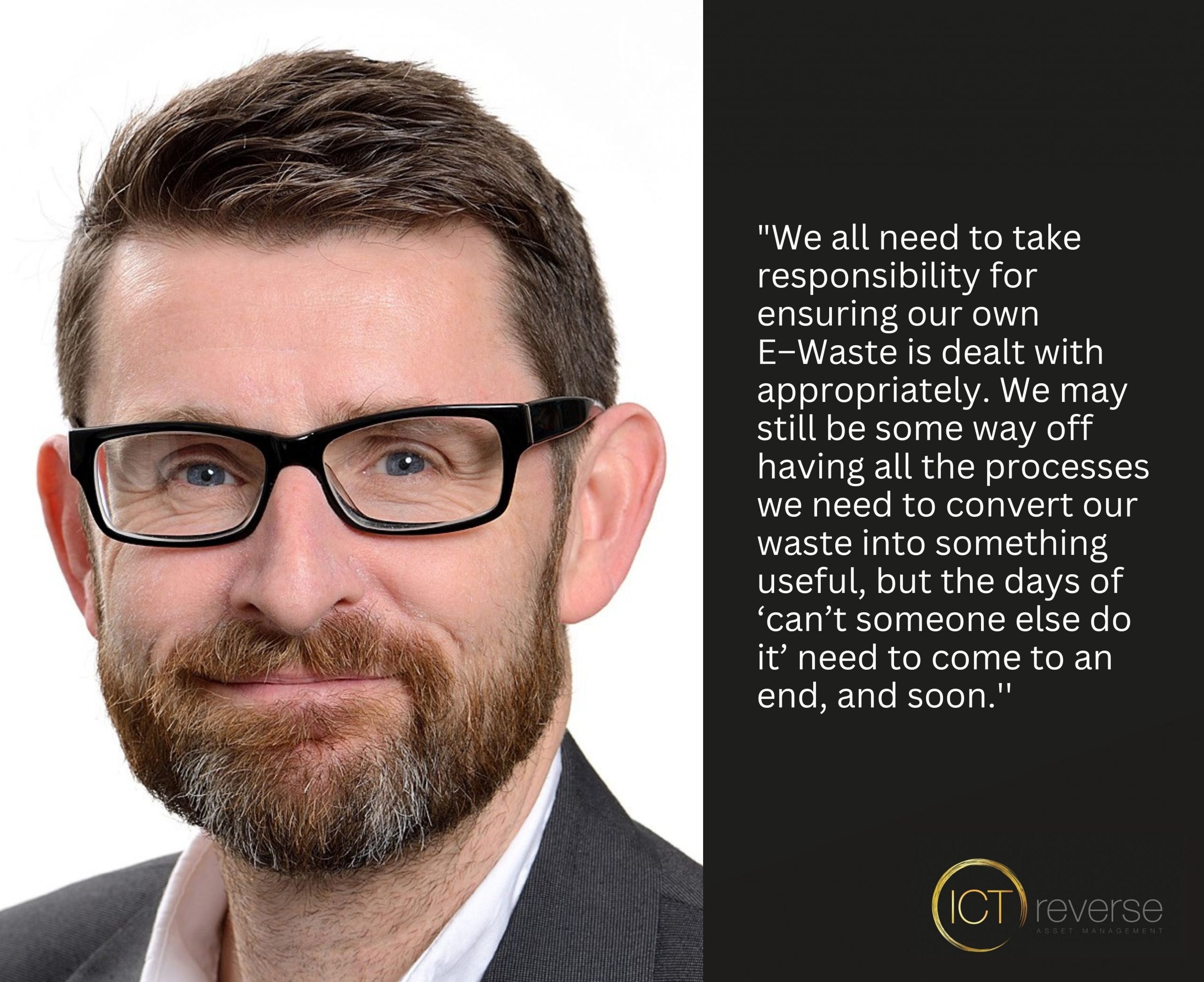Guest Blog by Prof Joe Sweeney: “E-Waste is Everyone’s Responsibility”

‘Trash of the Titans’ is one of the best–loved episodes of The Simpsons; in it, Homer is elected as Springfield’s sanitation commissioner, aided by the slogan ‘Can’t Someone Else Do It? Unfortunately, this phrase could often be used to summarise the attitudes of consumers and businesses to dealing with waste, of all descriptions.
In the modern world, everyone is swaddled by technology – phones, tablets, computers, smart domestic devices – to the extent that access to decent WiFi is more or less considered a human right. And of course, in many ways technology has improved lives enormously.
But a built–in feature of technology is that it is most effective when it is contemporaneous: up–to–date. This is especially true for mobile devices, where there is a constant clamour to have the newest, quickest phone, with the sharpest camera, and the best screen.
By definition, the newest technology is packed to the gills with new electronics, a dazzling array of processors, display technologies, lean, high-powered and reliable batteries, along with less glamorous hardware such as new power supplies and case materials. So, from phones to TVs, tablets to refrigerators, laptops to soundbars, our technological helpers contain a plethora of cutting edge scientific and engineering achievements.
We don’t often think about how these devices work – why should we? As consumers, we buy these things to use them, not to delve into their innards. But perhaps we should know a little more. Such as the fact that in 2010 less than 5% of lithium ion batteries from mobile phones were recycled. Or that that these batteries also contain metals such as cobalt, nickel, and manganese, all of which are toxic and can contaminate water supplies and devastate ecosystems.
Metals are important components of all modern electronic devices, from copper in power cables to silicon and gold in computers. But the modern need for speed has made new demands on these technologies, leading to the use of more esoteric (and often correspondingly more toxic) metals, such as hafnium (also used in nuclear reactor control rods), palladium, tantalum, boron, cobalt, tungsten, aluminium, iron, chrome, and nickel.
Toxic
All metals should be assumed to be highly toxic, and that list is not exhaustive, so it can be seen that if we want to dispose of our devices, there is a major clean–up needed. And cleaning up these things is neither trivial, nor cheap.
Because of the particular hazards associated with electronic equipment, a special classification of Electronic Waste (‘e–Waste’) is in use. e-Waste refers to discarded electrical or electronic devices, including everything from refrigerators and cookers to TVs and mobile phones.
Electronics are so ubiquitous in modern life, that the volume of e–Waste generated is increasingly large, and the lack of cost-effective methods for isolating and recycling the toxic components does not help; the UN’s Global E-waste Monitor announced in 2020 that 53.6 million metric tonnes (Mt) of electronic waste was generated worldwide in 2019. This represented an increase of just over 20% in only five years. Clearly this is a most worrying situation.
Why would we want to be able to extract these (often) toxic metals from old electronics, anyway? Well, because they are valuable (gold, palladium and other precious metals are often used in computer processors because of their high purity and resistance to oxidation), and/or scarce. They are also poisonous to most lifeforms, causing disruption to metabolic processes, including in mammals. So, there are both good economic and practical reasons to be able to ensure our e–Waste does not just get dumped.
This is why there is a global effort to meet this ecological challenge: October 14th is International E-Waste Day (#ewasteday) and in 2022 the focus will be on small items of e-waste, under the slogan ‘Recycle it all, no matter how small!’
We all need to take responsibility for ensuring our own e–Waste is dealt with appropriately. We may still be some way off having all the processes we need to convert our waste into something useful, but the days of ‘can’t someone else do it’ need to come to an end, and soon.
If you would like more information about how ICT Reverse can help your business recycle more efficiently and effectively, please call one of our Account Managers on 01524 580900.
Prof Joe Sweeney is the Dean of the School of Science, Engineering and Environment at the University of Salford and is ICT’s Reverse’s Scientific Advisor.
